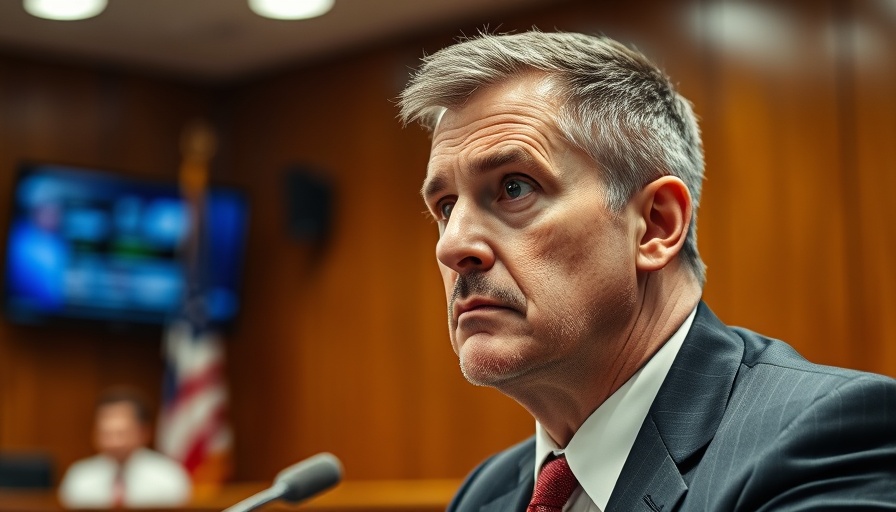
Revving Up Electric: The Future of Motorcycling in Detroit
In recent years, the automotive landscape has been shifting gears towards sustainable technologies, and Detroit—a city synonymous with the automobile industry—is embracing this revolution. Local innovators are transforming traditional gas-powered motorcycles into electric versions, breathing new life into these classic machines. This initiative not only caters to eco-conscious consumers but also addresses rising fuel costs, showcasing the potential for electric vehicles as a mainstay in transportation.
In 'Gas-powered motorcycles in Detroit getting electric tune-ups,' the discussion dives into how local innovators are turning traditional motorcycles electric, prompting us to explore the broader implications of this shift.
The Evolution of Motorcycle Conversion
A local Detroit company has pioneered the art of converting gas-powered motorcycles into electric models. This groundbreaking approach begins with a thorough inspection of the existing motorcycle frame, ensuring it meets safety standards before the innovative electric components are integrated. The creative design process, which includes hand sketches and patented technology, allows the team to adapt various motorcycle styles, making electric biking accessible and customizable for enthusiasts.
Electric Motorcycles: A Cost-Effective Alternative
One of the most compelling arguments for switching to electric motorcycles is the cost savings associated with powering them. While riders of traditional gas motorcycles may find themselves paying upwards of $3 a gallon for fuel, converting to an electric bike means spending just a fraction of that—approximately $0.25—for the same distance. This cost-effectiveness not only appeals to motorcycle fans but also makes a strong case for wider adoption among the general populace in Michigan.
An Accessible Future: No Special Infrastructure Needed
Unlike electric cars, which may require specialized charging stations, electric motorcycles offer a key benefit: they can be easily charged using standard wall outlets. This accessibility removes a significant barrier to entry for many riders interested in making the switch to electric, particularly in urban environments like Detroit. As the community embraces this change, it paves the way for greater acceptance and use of electric vehicles across the board.
Community Engagement and the Magic Moment
A pivotal aspect of this initiative is the reaction of those witnessing electric motorcycles for the first time. As the narrator from the video shared, the “magic moment” occurs when individuals realize that a motorcycle, which appears conventionally gas-powered, is actually electric. This powerful connection not only fosters curiosity but spurs conversations around sustainability and innovation.
Empowering Innovative Minds in Detroit
The local company encourages aspiring inventors and entrepreneurs to pursue their ideas fearlessly. Their message resonates particularly well in a community built on the spirit of innovation, urging individuals to prototype their visions and not to concede potential breakthroughs to larger corporations. This culture of creativity is paramount for the economic and technological growth of Michigan, encouraging a generation to rethink transportation, energy usage, and the overall approach to mobility.
Broader Implications for Michigan's Environment
The transition to electric motorcycles also aligns with broader environmental goals—reducing carbon footprints and air pollution. With cities grappling with the effects of climate change and urban congestion, initiatives like this may serve as templates for other cities across the nation. For residents in Metro Detroit, the embrace of electric motorcycles could signify a gradual shift towards greener, more sustainable practices in everyday life.
Looking Forward: The Future of Transportation in Detroit
As technology advances and more electric motorcycles hit the streets, industry experts predict a significant change in transportation trends. Motorcycling enthusiasts, city planners, and environmental advocates alike are keenly watching these developments unfold on the streets of Detroit. In a time where Michigan faces countless challenges—ranging from economic recovery to climate issues—these electric motorcycles are a hopeful sign of progress.
Overall, the conversion of gas-powered motorcycles to electric models is not just an innovation in Detroit; it is a representation of a larger movement towards sustainability and rethinking traditional concepts of transportation. The unfolding story captures the essence of a city evolving with the times while highlighting the importance of community-driven solutions.
As we observe these changes, it's crucial for local residents to stay informed about the rapid developments in automotive technology and community events. Keep tuning into Michigan local news for updates on such exciting initiatives!
 Add Row
Add Row  Add
Add 



Write A Comment